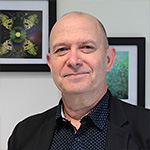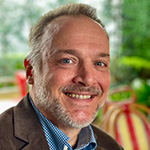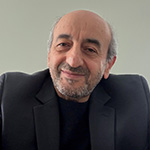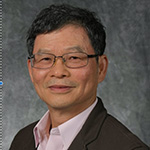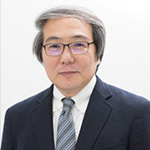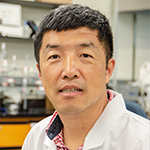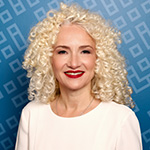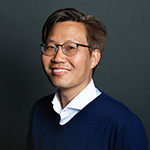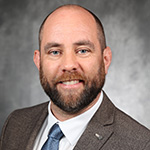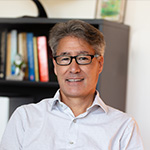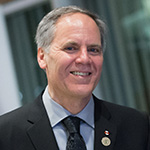 The Electrochemical Society (ECS) named 12 members to the 2025 Class of Fellows of The Electrochemical Society. This designation was established in 1989 to recognize advanced individual technological contributions to electrochemistry and solid state science and technology, and for service to the Society. These members are recognized for scientific achievements, leadership, and active participation in the Society. Each year, up to 15 renowned scientists and engineers are chosen by their peers for this honor.
The Electrochemical Society (ECS) named 12 members to the 2025 Class of Fellows of The Electrochemical Society. This designation was established in 1989 to recognize advanced individual technological contributions to electrochemistry and solid state science and technology, and for service to the Society. These members are recognized for scientific achievements, leadership, and active participation in the Society. Each year, up to 15 renowned scientists and engineers are chosen by their peers for this honor.
The 2025 ECS Fellows are (listed alphabetically): Thierry Brousse, Université de Nantes; Scott Calabrese Barton, Michigan State University; Uroš Cvelbar, Jožef Stefan Institute; Avetik R. Harutyunyan, Honda Research Institute USA, Inc.; Bing-Joe Hwang, National Taiwan University of Science and Technology; Ryoji Kanno, Institute of Science Tokyo; Xingbo Liu, West Virginia University; Radenka Maric, University of Connecticut; Nosang Myung, University of Notre Dame; Colm O’Dwyer, University College Cork; Jeff Sakamoto, University of California, Santa Barbara; and David Wilkinson, University of British Columbia.
The induction of the 2025 Class of ECS Fellows takes place on October 13, 2025, at the 248th ECS Meeting in Chicago, IL, USA.
Join us in congratulating our new ECS Fellows!
2025 Fellows of The Electrochemical Society
Thierry Brousse is a Distinguished Professor of Materials Chemistry at the École polytechnique universitaire de Nantes Université, and a leading researcher at the Institut des Matériaux de Nantes Jean Rouxel (Nantes Université/CNRS). A central theme of his research career has been the synthesis and characterization of metal oxides for various energy-related applications. This notably includes the development of alternative negative electrodes for lithium ion batteries, such as innovative Sn-based compounds, titanates, and niobates. During a pivotal sabbatical in Montreal, he prompted investigations into the charge storage mechanisms of pseudocapacitive oxides. His work in this area has since expanded to encompass a broad range of electrode materials, including metal nitrides and functionalized carbons alongside novel electrolytes—all integrated into hybrid devices, lithium ion capacitors, and microsupercapacitors.
Following his graduation from the École Nationale Supérieure d’Ingénieurs de Caen (ISMRa), Prof. Brousse earned his PhD in 1991, focusing on high-temperature superconducting thin films. He subsequently worked as an analytical chemistry engineer in the nuclear industry before joining Polytech Nantes as an assistant professor in 1994. He became a full professor in 2005 and was named Distinguished Professor in 2012. A member of ECS since 1996, he served as Associate Editor for the Battery and Energy Storage topical area of the Journal of The Electrochemical Society for 12 years (2012-2024). He organized ECS and ISE symposia on electrochemical capacitors, including related research areas. In 2009, he founded the International Symposium on Enhanced Electrochemical Capacitors (ISEECap), which biennially in Europe.
Scott Calabrese Barton is Professor of Chemical Engineering and Materials Science at Michigan State University. His research focuses on the interactions between reactions and transport in high-surface area electrodes, with particular emphasis on redox biocatalysts and transition metals. His research group combines experimental and computational approaches to discover and optimize new catalysts while advancing fundamental understanding of their activity limits. Research areas include biological fuel cell design, transition metal catalysis for oxygen reduction, and multiscale modeling of electrostatic channeling in enzyme cascades.
Prof. Calabrese Barton earned a BS in Aerospace Engineering from the University of Notre Dame, an SM in Aeronautics and Astronautics from the Massachusetts Institute of Technology, and PhD in Chemical Engineering from Columbia University under the direction of Alan West. After postdoctoral training with Adam Heller at the University of Texas, he joined the Columbia University faculty in 2001 before moving to Michigan State University in 2006. Prof. Calabrese Barton has published over 70 peer-reviewed journal articles (including 20 in ECS journals) and co-authored more than 70 ECS conference presentations. An ECS member since 1995 and Life Member since 2019, he guest-edited two Journal of The Electrochemical Society focus issues, served as Past Chair of the Energy Technology Division, completed multiple terms on three Society-level committees, and currently chairs the Education Committee.
Uroš Cvelbar is Head of the Department of Gaseous Electronics at the Jožef Stefan Institut and Professor of Nanotechnology at the Jožef Stefan International Postgraduate School, Slovenia. He is a leading figure in plasma-driven science, pioneering work in plasma nanotechnology, electrochemistry, and nanomaterials for applications in energy, sensing, and biomedicine. Over the course of two decades, his research has led to important innovations in plasma-enabled nanomaterial synthesis, energy storage, and environmental technologies. As one of the founders of plasma nanoscience and plasma electrochemistry, he has authored over 250 peer-reviewed publications and holds 20 patents.
Prof. Cvelbar received his PhD in Materials Science from the University of Ljubljana in 2005. He held visiting positions in Australia, China, France, India, and the US, and has actively contributed to international scientific communities. A Society member since 2008 and Life Member since 2022, he served in leadership roles in the ECS Dielectric Science and Technology Division and other ECS committees and currently serves on the Honors & Awards Committee and Individual Membership Committee. His achievements have been recognized with the 2023 Zois Recognition Award and 2011 Puh Award and Erudite Professorship, as well as three Slovenian Excellence in Science Awards and fellowships from the European Academy of Sciences and Arts and the World Academy of Art and Science.
Avetik Harutyunyan currently serves as Senior Chief Scientist at the Honda Research Institute USA and Visiting Scholar at the Massachusetts Institute of Technology, where he co-directs the MIT-HRI US Quantum Technology Program. A distinguished physicist and materials scientist with over four decades of pioneering research in quantum technologies, nanomaterials, and condensed matter physics, his work focuses on advancing quantum technologies and energy challenges.
An ECS member since 2008, Dr. Harutyunyan earned his BS in Quantum Electronics and holds a PhD in Physics and Mathematics. His research has earned over 120 patents and honors, including Fellowships from the American Physical Society and American Association for the Advancement of Science. His career spans prestigious institutions including The Pennsylvania State University, where he has served as Adjunct Research Professor since 2014, and earlier appointments at the N. N. Semenov Institute of Chemical Physics of the Russian Academy of Sciences and The Institute for Physical Research of the Armenian National Academy of Sciences.
Frequently invited to lecture globally, Dr. Harutyunyan has played a leading role in scientific advisory boards, journal editorial boards, and international collaborations. His innovations continue to shape emerging technologies in quantum sensing, sustainable energy, and nanoelectronics.
Bing-Joe Hwang is the Chair Professor in the Department of Chemical Engineering at the National Taiwan University of Science and Technology and Founder and Director of the Sustainable Electrochemical Energy Development Center at Taiwan Tech. His research spans subjects from electrochemistry to spectroscopy, interfacial phenomena, materials science, and theoretical chemistry.
Prof. Hwang received his PhD in Chemical Engineering from the National Cheng Kung University in 1987 and joined Taiwan Tech in 1988. He did research at the Institut für Elektrochemie der Heinrich-Heine-Universität Düsseldorf, Massachusetts Institute of Technology (2001), and Stanford University (2015. He is Executive Editor of ACS Sustainable Chemistry & Engineering. Considered the father of battery research in Taiwan, his work has resulted in 550 peer-reviewed publications with an h-index of 99 with 40,000 citations, and 80 patents. Among the many awards he received are the Humboldt Research Award (2020), Lifetime National Chair Professorship from the Ministry of Education (2020), and three Outstanding Research Awards from the National Science Council of Taiwan. He is a Fellow of the Royal Society of Chemistry, Taiwan Institute of Chemical Engineers, International Society of Electrochemistry, and Academician of the Asian Pacific Academy of Materials and Academy of Sciences of Lisbon.
An ECS member since 1994, he served as ECS Battery Division Member at Large from 2022 to 2024 and has been active with the ECS Taiwan Section, which he chaired from 2009-2010 and 2017-2018.
Ryoji Kanno is Institute Professor and Director of the Research Center for All-Solid-State Batteries at the Institute of Integrated Research, Institute of Science Tokyo. He is also a professor at the School of Materials and Chemical Technology at the Tokyo Institute of Technology. Prof. Kanno has made significant contributions to the field of electrochemical energy conversion devices. Since 1980, his research has focused on lithium and solid state batteries, resulting in the development of novel materials for next-generation all-solid-state batteries. He also conducted extensive research on electrode materials for lithium batteries. His contributions include introducing several physicochemical methodologies that provided valuable insights into reaction mechanisms during electrochemical processes. Dr. Kanno’s most significant achievement was his technological breakthrough in developing all-solid-state batteries. He discovered the solid electrolyte material LGPS, which is characterized by exceptionally high ionic conductivity. He also showed that all-solid-state systems are a promising technology for future batteries.
Dr. Kanno received his PhD in Science from Osaka University in 1985. He then conducted research at Mie University, Kobe University, Tokyo Institute of Technology, and Institute of Science Tokyo. To date, he has published over 500 papers with 26,624 citations in academic journals. Dr. Kanno received the 2017 ECS Battery Division Technology Award, and honors from the Chemical Society of Japan, The Electrochemical Society of Japan, Japan Society of Powder and Powder Metallurgy, The American Ceramic Society, and Kato Foundation for Promotion of Science. He joined ECS in 1995 and is now an Emeritus Member.
Xingbo Liu is Associate Dean for Research and Statler Endowed Chair Professor of Engineering at the Statler College of Engineering and Mineral Resources at West Virginia University (WVU). He established an internationally recognized research program focused on materials and electrochemical systems for next-generation energy conversion and storage. His work emphasizes high-temperature materials, including solid oxide electrochemical cells, high-temperature alloys, and protective coatings.
Prof. Liu earned his PhD in Materials Science from the University of Science and Technology Beijing in 1999 and subsequently joined West Virginia University (WVU) as a postdoctoral researcher in 2000. He became a member of the Mechanical, Materials and Aerospace Engineering faculty in 2002, then full Professor in August 2014, and was appointed as Statler Endowed Chair of Engineering in 2018. Liu also served as the Associate Chair for Research within the Department from 2012 to 2019.
Dr. Liu received numerous prestigious awards and honors including in 2016, The Minerals, Metals & Materials Society (TMS) Brimacombe Medal, 2013 State of West Virginia Innovator of the Year Award, 2011 R&D 100 Award, and 2010 TMS Early Career Faculty Fellow Award. In 2023, he was honored with the U.S. Department of Energy’s Hydrogen Production Technology Award for his significant contributions to the advancement of high-performance, efficient, and durable intermediate-temperature proton-conducting solid oxide electrolysis cells. At WVU, he has been recognized multiple times as the Statler College Researcher of the Year and has received several Outstanding Researcher Awards. An ECS member since 2010, has served in various positions on the H-TEMP Division where he is currently the Vice Chair. Dr. Liu is a Fellow of ASM International and the American Ceramic Society.
Radenka Maric has served as the President of the University of Connecticut since 2022. She oversees Connecticut’s $3.3 billion public flagship university, which includes six campuses and serves over 35,000 students. Under her leadership, the university has focused on fostering student success by creating opportunities that boost their skills in creativity, innovation, entrepreneurship, financial literacy, and emotional intelligence.
After earning her PhD in Material Science and Energy from Kyoto University, Dr. Maric began her career as a member of the technical staff at the Japan Fine Ceramic Center and later at Toyota Motors. In 2001, Dr. Maric moved to the US, and over the next three decades, played a pivotal role in advancing the development of electrochemical sensors, fuel cells, and materials and processes related to battery storage, hydrogen production, and various sensor technologies.
Dr. Maric forged strong partnerships with the State of Connecticut to establish QuantumCT, a significant economic development initiative aimed at fostering innovation in quantum technologies. She is also dedicated to securing major partnerships to support advancements in artificial intelligence and other emerging technologies that are shaping the future. She enhanced UConn’s infrastructure by constructing the 198,000 sq. ft. Science 1 STEM research and educational complex, as well as the Innovation Partnership Building, which received significant investment from the industry.
Dr. Maric joined ECS in 1999. She is a Fellow of the American Association for the Advancement of Science (2019), National Academy of Inventors (2019), and International Association of Advanced Materials (2020).
Nosang (Vincent) Myung is the Bernard Keating Crawford Endowed Professor in the Department of Chemical and Biomolecular Engineering at the University of Notre Dame. In this role, he directs two core facilities and leads the ND Sensor Initiative. His research focuses on the synthesis of nanoengineered materials and their application in advanced fields such as spintronics, chemical and biological sensing, electronics, optoelectronics, energy harvesting, and environmental remediation.
Prof. Myung earned his BS (1994), MS (1997), and PhD (1998) in Chemical Engineering from the University of California, Los Angeles. He then spent three years as a research engineer at UCLA before joining the Microelectromechanical Systems (MEMS) group at the Jet Propulsion Laboratory (JPL) as an engineering staff member in 2001. In 2003, he joined the Department of Chemical and Environmental Engineering at the University of California, Riverside, where he later served as Department Chair from 2011 to 2017. During his tenure at Riverside, he also founded the UC-KIMS Center for Innovative Materials for Energy and Environment. Prof. Myung joined the faculty at Notre Dame in 2020.
Throughout his distinguished career, Prof. Myung has been honored with numerous accolades including election in 2022 as a Fellow of the National Academy of Inventors and receiving the 2019 Engineer of the Year Award from the Korean Government and 2018 ECS Electrodeposition Division Research Award. An ECS member since 1996, he recently chaired the ECS Mid-America Section.
Colm O’Dwyer is Professor of Chemical Energy in the School of Chemistry at University College Cork (UCC) and leads a multidisciplinary research group developing 3D printed batteries, energy storage materials, optoelectronic materials science and processes, and photonic structures.
Prof. O’Dwyer received his PhD in Semiconductor Electrochemistry and Physics from the University of Limerick in 2003 and conducted postdoctoral research on ultracold atom cooling at the Université Paul Sabatier, Toulouse. He was a Science Foundation Ireland Stokes Lecturer on Nanomaterials at the University Limerick from 2008 to 2012 when he joined the UCC faculty. A Fellow of the Institute of Physics, he received a Bell Labs Prize in 2017. With talented students, postdocs and collaborators, Prof. O’Dwyer has coauthored >280 peer-reviewed articles, book chapters, and ECS Transactions articles, covering most of the Society’s topical interest areas.
After attending the 199th ECS Meeting in 2001 as a graduate student, Prof. O’Dwyer joined ECS. Over the next 24 years, he, organized or co-organized over 40 ECS symposia in electrochemical and solid state topics, and served the Electronic and Photonics Division as an Executive Committee Member for over 12 years, and as Division Chair from 2017 to 2019. He chaired many of the Society’s standing committees and is a member of the Board of Directors. He served as ECS Vice-President (2021-2024), and President (2024-2025).
Jeff Sakamoto holds the Mehrabian Endowed Chancellor’s Chair at the University of California, Santa Barbara, and is also Director of MUSIC, the US Department of Energy’s Mechano-Chemical Understanding of Solid Ion Conductors Energy Frontier Research Center. With 30 years of research experience in the field of electrochemistry, examples of his achievements include developing Li-ion batteries for the NASA 2003 Mars Exploration Rovers and ceramic electrolytes for advanced electrochemical technologies.
Prof. Sakamoto is a Distinguished Military Graduate (1996) and Commissioned Officer in the United States Army. After completing a PhD in Materials Science and Engineering at the University of California, Los Angeles, in 2001, he held positions at the University of Michigan, Michigan State University, and the NASA Jet Propulsion Laboratory.
In the earlier stages of his career, he studied separately the fields of electrochemistry, ceramic electrolytes and ceramic processing, and mechanics of materials. Later in his career, the three fields converged to align with the emergent field of mechano-electrochemistry, which is the multidisciplinary field that studies the coupling between electrochemistry and physical forces. Examples of the mechano-electrochemical phenomena he studies are the mechanical stability and kinetics of ceramic electrolyte-metal electrode interfaces, anode-free manufacturing, and stress corrosion cracking at fluid electrode-solid ceramic interfaces.
Advancing electrochemical technologies from fundamental to applied to commercialization research has been an integral part of Professor Sakamoto’s career. He has over 35 issued and pending patents licensed by two startups. He founded or co-founded these startups to commercialize components for advanced electrochemical technologies. He is a Kavli Fellow and was honored with the NASA Inventions and Contributions Board, Major Space Act Award for intellectual property (2006). Jet Propulsion Laboratory Solar System Exploration Programs Directorate Bonus Award (2004), and several teaching awards.
David Wilkinson is a Professor of Chemical Engineering and a Tier 1 Canada Research Chair in Clean Energy and Electrochemical Technologies at the University of British Columbia (UBC). His university research covers a wide range of electrochemical areas including fuel cells, electrolyzers, battery research, carbon dioxide and nitrogen conversion, electrochemical approaches to clean energy and fuels, and electrochemical treatment of wastewater and drinking water. Companies use much of this research, resulting in the formation of Mangrove Lithium, a new company using a modified electrodialysis process for improved lithium refining and recycling.
Prof. Wilkinson received a BS in Chemical Engineering from UBC (1978) and PhD in Chemistry (1987) from the University of Ottawa under the guidance of Prof. Brian Conway. Before joining UBC in 2004, Prof. Wilkinson spent over 18 years in electrochemical industries, as a group leader in electrochemistry at Moli Energy developing rechargeable Li metal batteries, and at Ballard Power Systems as a Director and Vice President of R&D in polymer electrolyte membrane fuel cells and hydrogen technology. He spent a short period as a Group Leader and Principal Research Officer with the Canada National Research Council. In 2002, he received the ECS Battery Division Technology Award for his work related to rechargeable Li batteries and polymer electrolyte fuel cells, and the ECS Canadian Section Electrochemical Award in 2022.
Prof. Wilkinson published more than 260 refereed publications, a co-authored book, a number of edited books and book chapters, and holds over 84 issued US patents. His research has been honored with awards including the Grove Medal, Lifetime Award of the Canadian Hydrogen and Fuel Cells Association and the Order of Canada, as well as fellowships in the Engineering Institute of Canada, Canadian Academy of Engineering, Chemical Institute of Canada, Royal Society of Canada, and the International Society of Electrochemistry. An ECS Emeritus Member, Prof. Wilkinson joined the Society in 1982 and served for many years as Member at Large for the ECS Canada Section.


